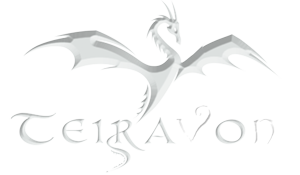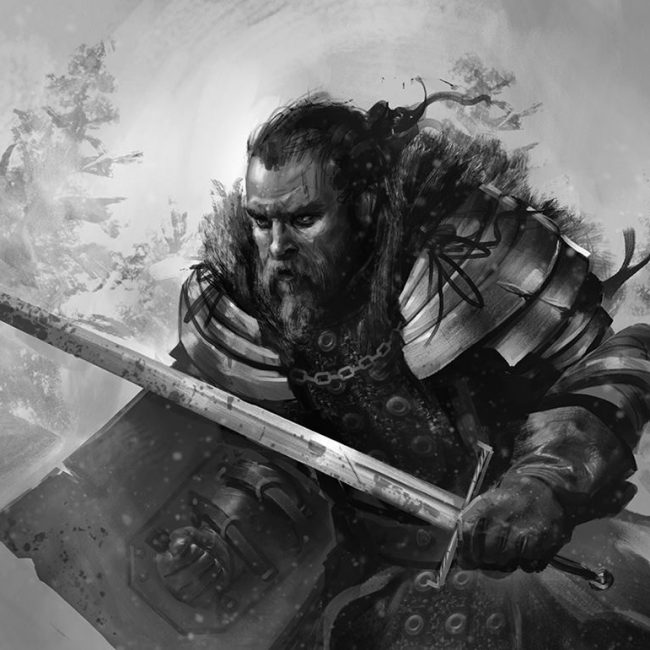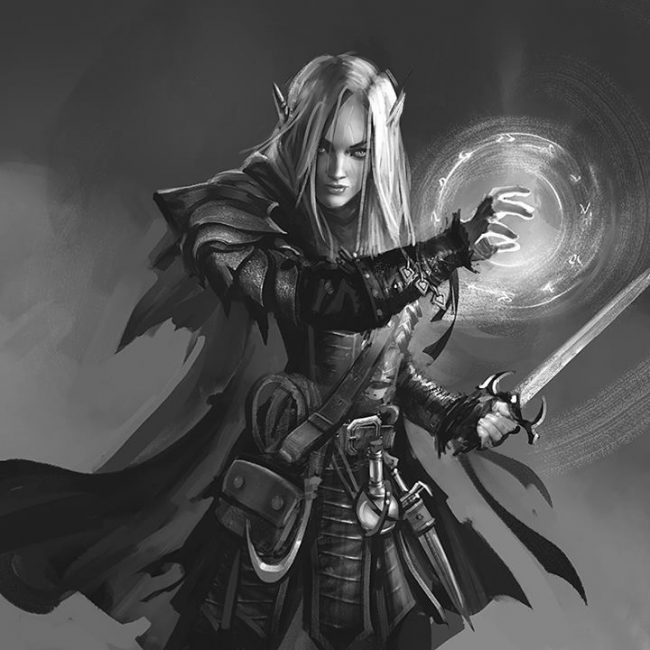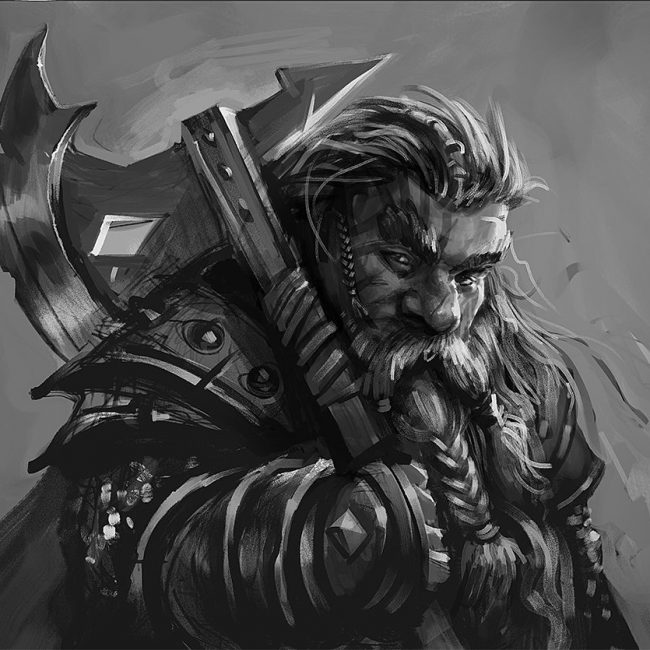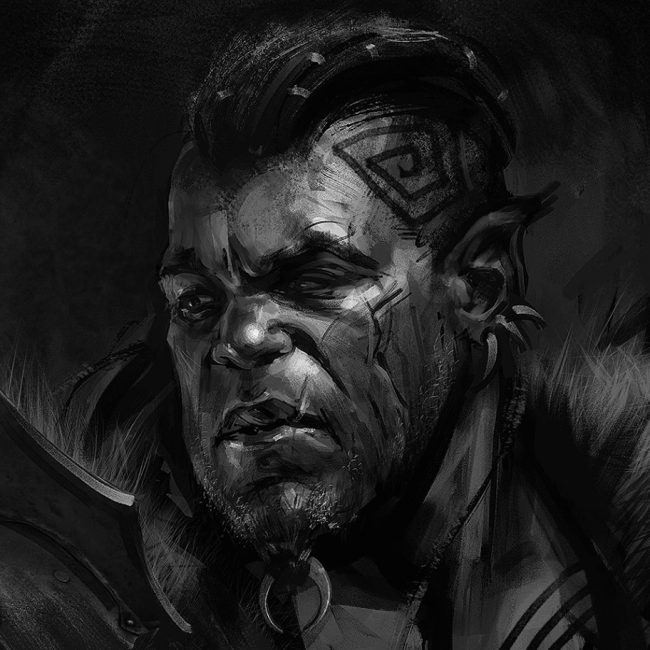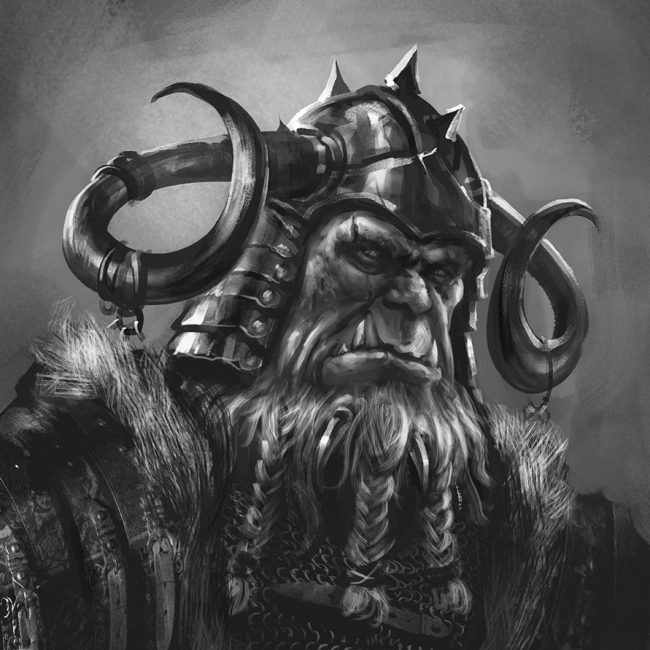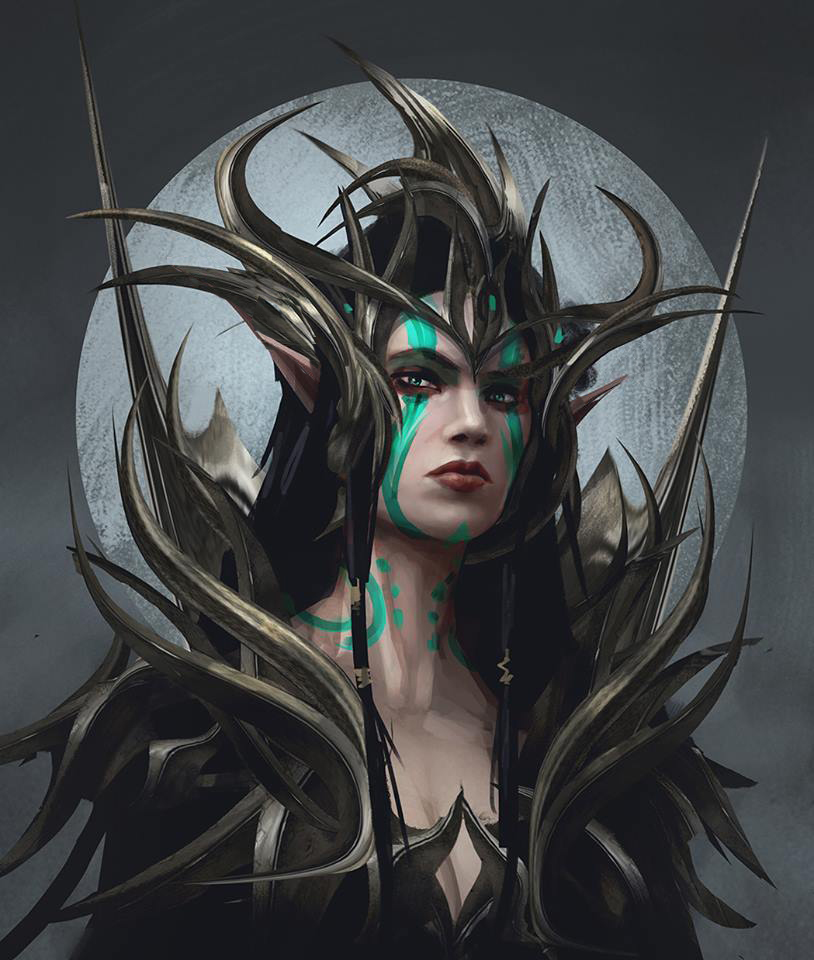
Elehir

The Elehir, the ‘light born’ live high above the snowlands, in the warmth of a great caldera. Amidst the trees sit the spires of the Malán homeland.
The Elehir are attuned to the constructs of magic in all forms and have a natural affinity to ‘weaving crystal into song’ or extracting the magical force from the crystal that permeates the region. Devoted to knowledge and the preservation of history and quest for knowledge, they develop a respect for anyone they deem as a peer seeking to broaden their minds. They have developed an attachment to the natural world, fiercely defending their borders and way of life.
Denemir

The Denemir, the ‘battle born’, are taller and more muscular than their silvery cousins. They have long stood as guardians of the realm of the Malán. They are tribal in nature and prefer to live in small pockets in the area.
Their relationship with the Elehir is tenuous at best; the reason for such lies in political differences, which defy the very nature of the Denemir for they desire to remain uninvolved in these workings of society. Malán who dwell in this region find themselves physically adapting to match their surroundings, most noticeably taking on coloration reflecting the local environment.
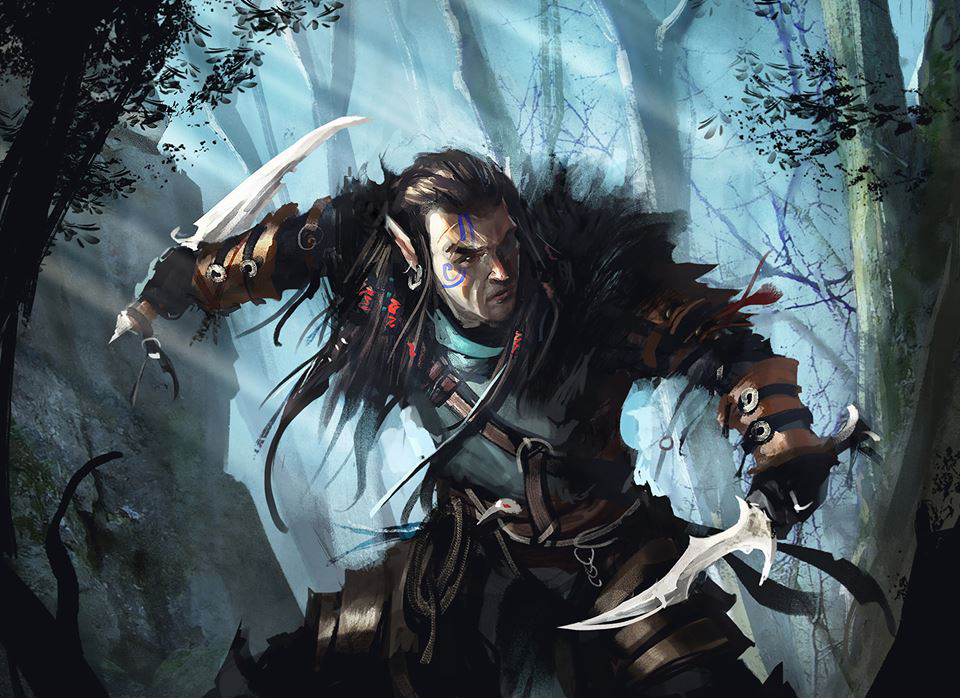
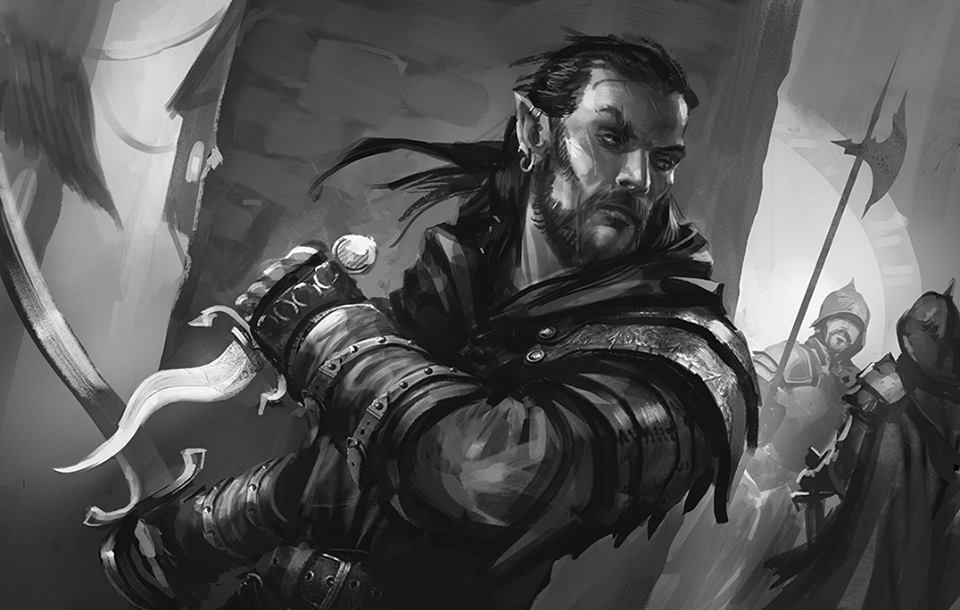
Oromir

The ‘blind born’ are so called for their having been scattered to distant nations, alienated from their Malán kin. They have had to adapt to living-as best as they can-among or on the outskirts of human cities and villages.
Small and agile, the Oromir are well suited to living and working outside of sight of society. It is rumored than there is more to their split from their homeland, although this is widely contested. Some dream of one day returning to their homeland, while wish for nothing more than acceptance into human society.
Oromir inspire more conflicting emotions than any other race of Malan. Clever and skilled, Oromir are also opportunistic and hot-tempered. They never forget a friend and never abandon an ally. They are also adept merchants—cunning negotiators who love the interplay of bargaining, and strive to come out on top in every deal.
Excerpt from:
Chronicles of the Málan
The wedge driven between the Elehir and the Denemir predates written history. What is known is that Tihr a’ Lahn and Beliranor had a bitter disagreement and the governing body of the Málan, the Council of Elders, was thus divided. This is why we have come to know their kind as two distinct and great houses. While it is true that there is a third faction comprised of their kind, we will make little mention of these unfortunate folk, as they are regarded as insignificant by their brethren and wield no political power within the Málan sphere. Where it concerns the two great houses of the Málan peoples, know this: while they may work against each other where it concerns their own motivations – they will not conspire against one another in concert with non-Málan species.
When the Málan peoples were split, some expected war. No war came. Seeking to avoid confrontation all parties retreated to their lands. While his support was lesser, Beliranor remained unhindered in his assertion that the true threat was—Man. He knew that these beings brought forth from the dirt, would not be content to share this world. They possessed within them a natural curiosity that once wed to ambition would make them recklessly driven. Beliranor foresaw what Tihr and the council seemed unwilling to see—that Man would seek to claim all of Teiravon for his own.
Faced with the complacency of the council, Beliranor took matters into his own hands and learned the battle tactics of his foe and trained his followers. They engaged in raids against settlers who resided too close to the borders of the elven lands, and pushed those boundaries further outward as travelers and explorers pushed further in. Seeing encroachment as blight, he sought to end it by cutting off supplies to those that entered protected lands. Many settlers were provisioned through a nearby town called Breakwater. Beleiranor attacked the town and razed it to the ground. None were left alive, and it is said that Tihr a’ Lahn wept for what her kin had done.
Excerpt from:
An ancient Málan text
NOTE: Oromir are an outcast faction, choosing to reside alongside Man.
- On the name of their peoples – Málan
At one time, all of the higher beings of this world were called, Málan. We sought no distinctions. We were all of nature – born to rein over the land. All who had been blessed with a sense of self-awareness carried this name, no matter their physical differences. We were the ancients and we were one. With the split in the Council of the Elders and the formation of the Elehir and Denemir, the various beings that had once been content to call themselves Málan sought names for themselves as well. The name of our people persists – but no longer encompasses the whole of the ancient beings that once resided in this land. The Fey and folk like them have adopted their own names and distinctive class systems. I cannot help but lament the lessons they learned at our knee. It seems a corruption – and I hold myself accountable. – Lady of the Forest, Tihr a’ Lahn
- On the creation of the Málan
I have been asked, “Where did we come from?” It is not a simple question to answer because words are wholly incapable of expressing our origin. The answer becomes a vague riddle in its own right. We are Málan. We woke when the world woke, as the Creator breathed life into the alheimur. Where? When? These are all concepts that cannot be quantified by a babe born to a mother, or a people born to a world. – Lady of the Forest, Tihr a’ Lahn
Excerpt from:
The Book of Curses
- Málan involvement in the fracturing of our world
The creation of the world is yet a mystery still whispered among the quiet corners of the realm. The self-titled “gods,” who were nothing more than tyrants – reined over all of Teiravon eons ago and would tolerate no worship of any but themselves. These false monsters of the dark lands walk the corrupted path of the abandoned. Had the world always been in this form? There was no history to refer to but it is whispered that the Málan unleashed the false gods by calling upon the powers of the deep chasm to preserve their lands and to keep them invisible to the outside world. Instead the “gods” took dominion over each area of nature and unleashed chaos. Note: it is believed that those referred to as gods in this text are in fact the elements.
Excerpt from:
The Book of Journeys—by Crenok the Liar
Note: Crenok the Liar came by such a name because of displays of public drunkenness and a penchant for writing fiction which he sold as historically accurate. What is known of the man is that he was well traveled. The following comes from his elder days – when he had already been discounted amongst scholars. It is this writer’s belief that the only reason why he was allowed to live after this encounter was because the Málan believed that his account would be dismissed.
- The Arrogance of the Málan
The Málan have secreted their history because of ‘unfortunate events’. These events whatever they are may be more a convenience than a viable reasoning.
It is my belief that knowledge can be used much like a weapon and the more it is kept clandestine, the greater its power grows. Rather knowledge should pass as a gentle summer wind. Those who choose to can open themselves to it and others can live ignorant to it despite its push, but it should be free for all to access. Whoever seeks wisdom should find it granted. And those who hide it away are selfish and prideful beings that see would demand that worthiness be determined in order to receive it. How shortsighted and skewed is this view? For who is to judge whether or not one is worthy?
The Málan have failed to preserve their great history and vast knowledge by hoarding it away. Unwilling to open the doors of the great halls of the Elders even to their own kind, they have done themselves a great disservice and a terrible harm. Who knows what secrets lie within? My curiosity is more inclined to indulge what follies the elders chose to hide from the world’s eyes. I stood among the ancients and saw no more than squabbling children, as selfish and stubborn as the humans to whom they saw themselves superior. What hopes I had, what questions burned in my mind…all but forgotten as I pondered my place in this setting. In the moment they turned to me and grew silent, I wondered if they had more questions than I, and in their faces I saw that they lacked all hope of finding the answers they sought.
That I was permitted to leave alive, still puzzles me. I cannot say that I envy their existence but there remains within me a desire to return. There is a youthful flame that burns in me, a want to stand amid the ancients once more and marvel at what was lost and hope for what could be once again. It is at once both heartbreaking and exhilarating, and I have been made richer for having born witness.
Excerpt from:
The Proverbial Fool – author Anonymous
Scholars surmise it may be Beliranor himself who wrote this text. While Beliranor is been assumed to wield a quill as a child might wield a sword, there is evidence that he has eloquence in oration that cannot be dismissed. It is surmised that when the divisions of the Elehir and Denimir occurred he sought to strike a blow against the intellectual elites that sided with Tihr a’ Lahn. Thus it is thought that he spoke these words and ordered them put to paper.
Proverbial Fool – Chapter 16:
The stories are lies—there are but three that all are slave to: nature, time, and death—for none may surpass these, nor escape their power.
Proverbial Fool – Chapter 28:
It is not well known that the Málan did not discover the arcane on their own—it was taught to them by the children of the earth. They were in close bond with nature and in tune to such things. The Málan knew little of the power of the crystals from deep within the earth. The children taught them how to harness the power, and deeply regretted having done this deed, for Málan clerics used it in ways that the children never had. It was a bargain forged long ago, and for it the children lost both their power and their home.
Excerpt from:
An informal interview with Joaquim Quill – Royal Historian
What would you have me say of the elves? To start, it would show the respect due to these enigmatic creatures by calling them by their true name: Málan. Beyond that there is a trove of information so well known that you could seek out any kitchen wench or maid servant for insight. They are beautiful, they are long lived, they are blessed with skills at crafting, and they are formidable in combat. Anecdotally speaking, they shit gold, fart rainbows, and diamonds spring from their eyes instead of tears! Unless you’re an unfortunate Oromir (lesser Málan), that is. The Oromir have lost all semblance of their true nature. Don’t bother to consult one of these poor creatures should you seek cultural insights—they’ve lost any commonality to what they originated from and have lived amongst men for so long that they’ve adopted their culture, creating a mish-mash of language, ideals, and values. I doubt a Málan would bend an ear to one, so to speak!
Perhaps I’m too harsh on the Oromir, in fact it’s no fault of their own that they exist as they do. And many have dreams of returning to the homelands and finding acceptance. Others are quite happy amongst the humans, although their lives can’t possibly be easy. In some kingdoms they are barely tolerated, in others they are driven to live in the outskirts, beyond the protection of castle walls. Many have turned to a gypsy life, traveling from town to town selling what they can and sometimes, what others won’t. We will speak no more of that.
The elves you wish to hear about, no doubt are the Elehir and Denemir. There are few left, and fewer still who have had the opportunity to lay eyes on one. They appear as normal elves, if they choose. And most of the time, appear not at all! They live in a crystal city in the sky, so it is said. Rubbish, I say. It’s also said they are gods themselves, but I don’t believe it. All that I’ve found in ancient writings points to them being mages, very powerful, and very much immortal. Does that make them gods? To some yes, but there are plenty of “immortal” creatures—and plenty of those can be slain—albeit seldom by any normal means. The Málan are no exception.
From the Málan sprang the Elehir, in whose ancient tongue means “light”, or “weightless”, or…I suppose it could mean “angel shit” for all it’s worth.
Their more brutal kin, the Denemir, saw ancient men as a blight upon the earth. They sought to protect the lands they controlled and saw man as nothing more than an animal that needed to be culled. At some point Tihr a’ Lahn came to believe that men should not be destroyed. Beliranor did not agree, and their views split the council. Tihr a’ Lahn sought magic to hold off men, siphoning off more of the crystal power from the deep. She sought to create a land distant from men, separated by a wall of illusion, a barrier that could not be seen or felt. She went too far, obsessed with the power that she drew from ever deeper sources. It would be the world’s undoing. She called upon a power greater than she was capable of wielding and this brought with it ruin.
When the great sundering came, all was broken apart and the path to the depths lost. The force that had been created was enough to separate the lands and caused them to float apart. Tihr a’ Lahn at last had her separation but at the cost of Beliranor and all that chose to follow him. He became obsessed himself—with continuing his quest to wipe out men from the earth. Some followed him, these became what we now know of as the Denemir. The other elves left as well, for the lands below, leaving only the fractured council behind.
Tihr a’ Lahn at last relented and joined her kin in the lands below, where the new city was built and stands to this day.

